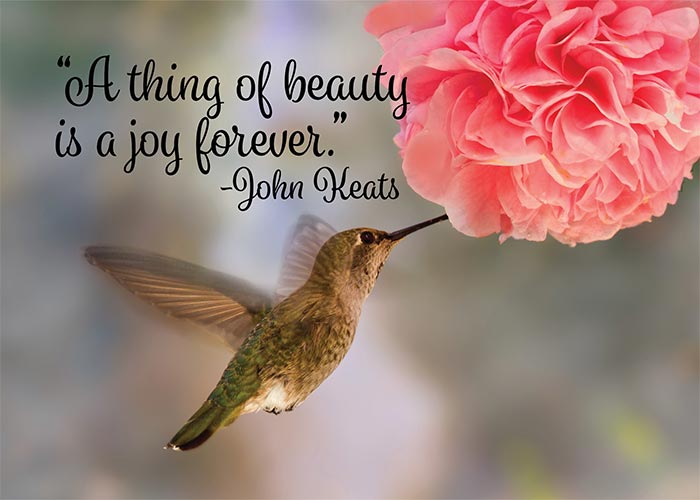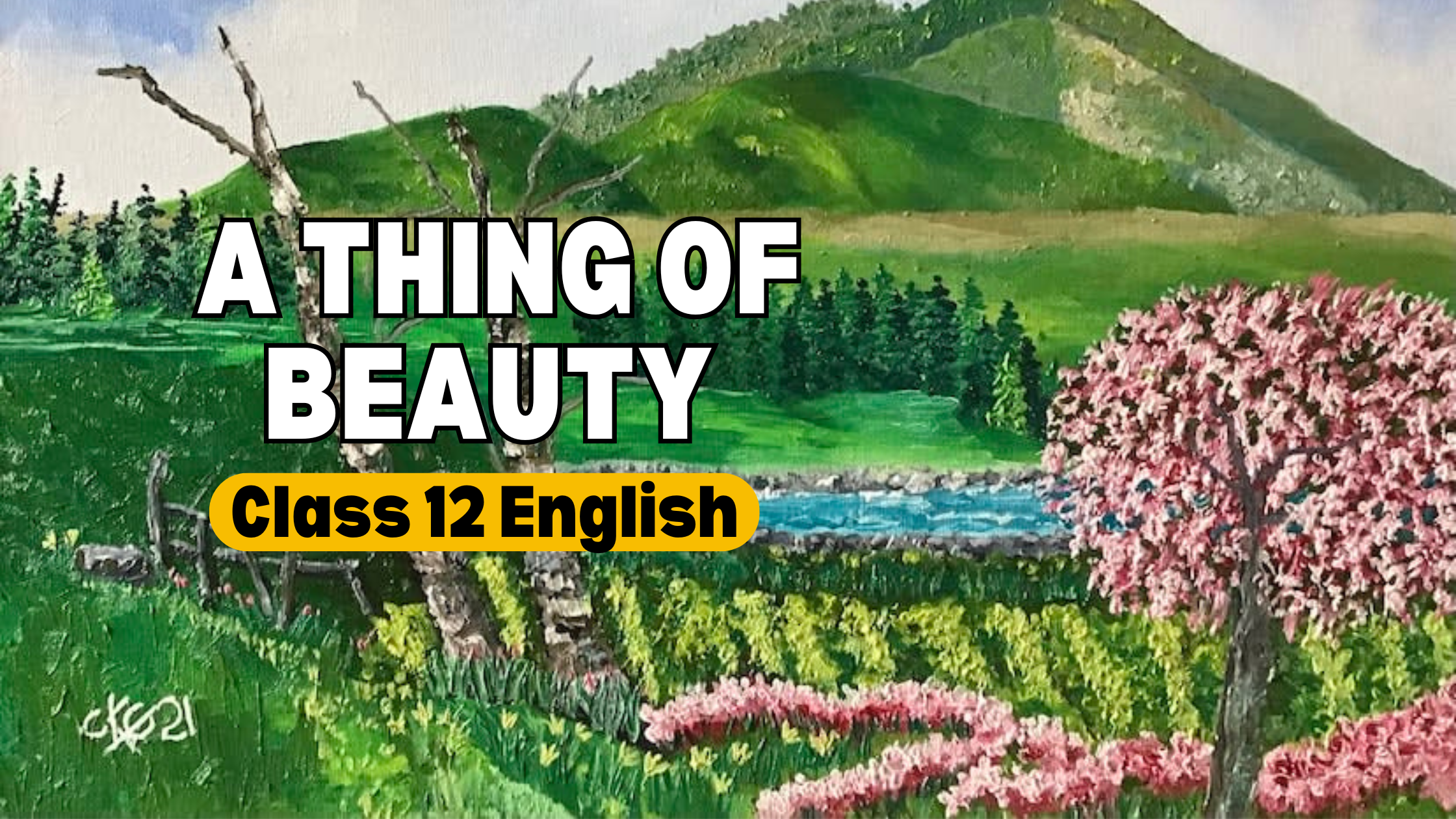A thing of beauty poem written by John Keats tells us that beauty is a constant source of joy, its beauty keeps on increasing and never passes into nothingness but provides us a shelter and gives us peace to relish the beauties of the earth.
Sometimes we suffer from gloominess and forget to enjoy the salad days of one’s life. These all inculcate unhealthy practices causing suffering and pain.
About the poet: A Thing Of Beauty
John Keats was a romantic poet and his poetry is characterized by sensual imagery in his most popular work which is a series of odes. His poems are one of the most beautiful creations in English literature. The above-given poetry is an extract from his poem, -Endymion: A poetic Romance-(1818), considered to be an epic poem.

Main theme: A Thing Of Beauty
The summary of the poem A thing of beauty is based on a Greek legend where a young shepherd named Endymion had a vision of the moon goddess, Cynthia. He made a commitment to go after her and seek her. In his quest, he wanders into the woods and under the sea.
Here, the poet tells us that beautiful things bring pleasure and happiness and give us an abundance of good reasons to feel happy and energetic. Beauty is like a tonic and an endless fountain of nectar, resulting in everlasting joy. It also takes away our sadness and gives us many happy reasons to enjoy.

Rhyme scene
Aabbc is followed in all the stanzas.
Poem’s analysis: A Thing Of Beauty
Stanza1
A thing of beauty is a joy forever Its loveliness increases, it will never Pass into nothingness, but will keep A bower quiet for us, and asleep Full of sweet dreams, and health, and quiet breathing.
The poet believes in the fact that beauty stays forever and never fades away. It never goes off with the passing time rather it increases and beautifies more and more. He compares beauty with a shady place that gives us the comfort to fall asleep and dream, quietly breathing will lead to good health.
Meanings
- Bower: A shady place under the tree
Literary devices
- Alliteration: Use of consonant sound at the start of two words which are close in series (Sleep-Sweet)
- Metaphor: bower Quiet (calmness of the bower is compared to the calming effect of a beautiful thing)
Stanza2
Therefore, on every morrow, are we wreathing A flowery band to bind us to the earth, Spite of despondence, of the inhuman dearth Of noble natures, of the gloomy days, Of all the unhealthy and o’er-darkened ways Made for our searching: yes, in spite of all, Some shape of beauty moves away the pall From our dark spirits.
Everyday beauty files our heart to cherish each and every moment and builds our desires to forget the gloomy days and even if we are surrounded by melancholy things and bad people. According to the poet, the reason behind sadness and cruel people is negativity all around, and to counter these we need to enjoy each and every moment of our life because these beautiful things bring positivity.
Meanings
- Morrow: The following day
- Wreathing: surround, decorate
- Despondence: depressed
- Gloomy: sad
Literary devices
- Anaphora: Use of the same word in two consecutive lines (of noble natures- Of all the unhealthy)
- Alliteration: Use of consonant sound at the start of two words which are close in series (‘b’ in Band Bind, ‘n’ in Noble nature, ‘s’ in some shape).
- Metaphor: wreathing a flowery band (the beautiful things of our life bind us to the earth)
- Imagery: creating a sensory effect of beautiful things lined up in a string ( A flowery band to bind us)
- inversion: normal order of words is reversed ( Are we wreathing a flowery band)
Stanza3
Such the sun, the moon, Trees old, and young, sprouting a shady boon For simple sheep; and such are daffodils With the green world they live in; and clear rills That for themselves a cooling covert make ‘Gainst the hot season; the mid forest brake
The poet here explains that beauty is all around us in earthly things, we just need the vision to cherish those things. These are nature’s gifts like sun, moon, trees, etc providing us with shade, beauty, and coolness and are considered a boon for humanity. These are blessings that we need to cherish every moment to keep away from the negative vibes.
Meanings
- Boon: blessing
- Rills: a small stream
- Brake: a process to slow down; halt
Literary devices
- Alliteration: Use of consonant sound at the start of two words which are close in series (‘s’ in Sprouting Shady, Simple sheep, ‘c’ in cooling covert)
- Imagery: Trees giving shade (sprouting shady boon), growing process of daffodils (daffodils with the green world they live in), Clean river streams (Clear rills)
- Antithesis: opposite words placed together (old and young)
Stanza4
Rich with a sprinkling of fair musk-rose blooms; And such too is the grandeur of the dooms We have imagined for the mighty dead; All lovely tales that we have heard or read; An endless fountain of immortal drink, Pouring unto us from the heaven’s brink
The poet carries forward his idea of gifts of nature present on the earth, like beautiful musk of roses giving a nice and sweet fragrance. Furtherdescribes the tales of the valiant comrades who laid their lives for their nation or humanity. These beautiful things are like nectar which are immortal and need to be cherished in spite of having many sorrows in our life.
Meanings
- Grandeur: splendor
- Mighty: enormous; huge
- Immortal: never dying; unfading
- Brink: edge
Literary devices
- Alliteration: Use of consonant sound at the start of two words which are close in series (‘h’ in having heard)
- Metaphor: Immortal drinks ( beautiful objects of nature are forever like a neverending portion of a drink)
- Rhyme: Rhyme scheme is used in every stanza of the poem (forever; never, keep; sleep, dead; read, etc.)
- Imagery: Bushes full of musk roses (sprinkling of fair musk rose blooms), books describing valor of fighters (grandeur-..mighty dead), god providing us with best things (pouring from the heaven’s brink)
Conclusion
The poem a thing of beauty tells us to value those things that are bestowed upon us in the form of trees, sun, moon, rivers and are a boon to humanity but instead of feeling grateful towards god’s gifts, we focus on negative vibes like sorrow and unhappiness.
Related Articles

